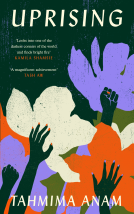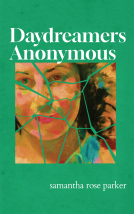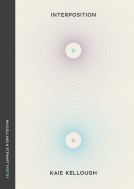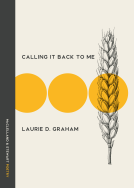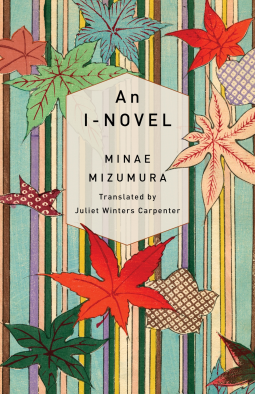
An I-Novel
by Minae Mizumura
This title was previously available on NetGalley and is now archived.
Send NetGalley books directly to your Kindle or Kindle app
1
To read on a Kindle or Kindle app, please add kindle@netgalley.com as an approved email address to receive files in your Amazon account. Click here for step-by-step instructions.
2
Also find your Kindle email address within your Amazon account, and enter it here.
Pub Date 2 Mar 2021 | Archive Date 9 Jun 2021
Talking about this book? Use #ColumbiaUP #NetGalley. More hashtag tips!
Description
Published in 1995, this formally daring novel radically broke with Japanese literary tradition. It liberally incorporated English words and phrases, and the entire text was printed horizontally, to be read from left to right, rather than vertically and from right to left. In a luminous meditation on how a person becomes a writer, Mizumura transforms the “I-novel,” a Japanese confessional genre that toys with fictionalization. An I-Novel tells the story of two sisters while taking up urgent questions of identity, race, and language. Above all, it considers what it means to write in the era of the hegemony of English—and what it means to be a writer of Japanese in particular. Juliet Winters Carpenter masterfully renders a novel that once appeared untranslatable into English.
Advance Praise
"A genre-defying meditation on emigration, language, and race . . . a brilliant document that seems, if anything, more relevant today than upon its original publication. Mizumura’s work is deeply insightful and painstaking but never precious."
— Kirkus Reviews, Starred Review
"In an age of so many books about identity, An I-Novel stands out for the tough questions it poses. It’s not difficult to read, since Mizumura is a fluent and entertaining writer . . . Mizumura’s books reclaim the particularity, the untranslatability, of her own language. And they do so without the slightest whiff of nationalism."
— Benjamin Moser, New York Times Book Review
"An I-Novel is an intriguing, nuanced portrait of a family in flux, and of a young woman finding her creative center between two worlds.
—Foreword Reviews, Starred Review
"A tour de force by translator Juliet Winters Carpenter of one of Japan’s most exciting writers."
—Chicago Review of Books
"[An I-Novel's] yearning for equality and belonging should universally resonate with readers."
—Japan Times
Available Editions
| EDITION | Other Format |
| ISBN | 9780231192132 |
| PRICE | $22.00 (USD) |
Average rating from 35 members
Featured Reviews
An I-Novel was an intriguing and captivating read. It presented a delightful character study of Minae, and I really felt like I got to know and understand her as she pondered her feelings about leaving Japan, living in America, and her desire to return to her homeland and her native language. This novel was originally written in Japanese, with a bit of English thrown in here and there throughout. That is difficult to replicate in an English translation. What the translator has done is change font for the sections that would have stood out in English in the original. This works as a marker, and it's interesting to see when they occur; however, I don't think you could ever exactly capture the feel of the original work in an English translation. I am currently learning Japanese, so I liked the occasional kanji or phrase that were included, some of which I was pleased to see I could understand. As someone who has moved country (albeit not to somewhere with a different language), I found it easy to relate to Minae and her experiences and feelings, and overall An I-Novel was a thoughtful and interesting read that I really enjoyed. I am giving it 4.5 stars. The only reason it doesn't get five is because I think that, stylistically at least, something gets lost from this work in the English translation.
 Leah H, Reviewer
Leah H, Reviewer
An I-Novel was originally published in Japanese, and is the author’s introspective look at growing up in the US after her father is transferred there when she is 12. The novel in its original form, is scattered throughout with random English words and phrases that fit in with the conversations or storyline and that the author felt her audience would easily understand, but in translated form, especially English, the translator chose to use a different font to notate these words or phrases.
The novel itself doesn’t really have a plot per se, which is interesting because the author describes the novels of Japanese authors that she read growing up the same way. It’s more of her thoughts and conversations put on paper, resulting in us getting an idea of what it was like for a young Japanese girl to arrive in New York in the 1960’s and spend the next 20 years living in America, trying to fit in but at the same time trying to maintain her Japanese-ness, and realizing that the two will never co-exist. At the same time we meet her sister Nanae, who basically did the opposite. We all go through the internal struggle of “who am I?”, but Minae had to do it in a different country and with a different language which were polar opposites of each other.
I felt a lot of empathy for Minae. As a student at Uni in Japan in the 1980’s, a lot of the same situations she described, I encountered too. There is something different about living in a foreign country for years as a resident vice just visiting. Ultimately, regardless of where you are born, or where you grow up, we all just want to be accepted for who we are and not have to fit in some box of someone else’s design.
Thank you to NetGalley, the publisher, and the author and translated for an ARC in return for a fair and honest review.
I was sold out for this on the first few pages!
As much as I love a book for being fast paced, full of dialogues and drama, I absolutely love it when they are just… therapeutically descriptive.
I learned that an I-Novel is a confessional genre in Japanese literature which Mizumura, very creatively, turns into something semi-autobiographical with a pinch of fiction. I was so excited to read this and for a lot of reasons- mainly because of how it was first published in 1995, promoted and positively perceived in Japan as the nation’s first bilingual novel.
Minae Mizumua had to come to America as a child when her father moved from Japan with her mother and older sister. Now it’s been two decades, being an expatriate graduate, the pull of her motherland and the push of America being a foreign land has always swirled Minae, but is risking to leave it all behind for Japan which has changed radically, a good decision?
I thoroughly enjoyed every word of this book. I wish I could talk about all of the trivial and abysmal details that filled the pages of this beautifully written and equally stunningly translated book.
"Did the literature not arise from the deep desire to do something wondrous with the language? In my case, it was a desire to be born once again.”
If there’s one thing that I could point out was how I deeply connected with her thoughts on the English language which has become something primeval with mother tongues we always put second to it. Being in a country like India, which I firmly believe is obsessed with everything western, English has crept slowly to a ladder where I find people being shamed for not so “fluent English” regularly. In a land of languages, someone getting looked down upon for being who they are instead of adapting to western attributes is just plain sad and pathetic, but well, that’s just India for you.
I love how it subtly hints at the prevalent prejudice and racism, not just against the Asians, but rather against all those essentially “non-white”.
The only thing that left me a bit disgruntled was how it tended to time-jump quite frequently, though I guess for being a story set in a single day in 1980s while she recounts the past and dreams wishful future, it was artistically inevitable.
This has a certain peculiarity of Asian literature, something poetic, lyrical yet raw, melancholic throughout.
Thanks to NetGalley and Columbia University Press for this eARC in exchange for an honest review!
 Shana A, Reviewer
Shana A, Reviewer
The I-Novel is a style/genre that I wasn't familiar with before reading this one, and now I am intrigued. I was left wondering how much of this was true to Mizumura's experiences, and a quick Google search shows that there are many details that reflect reality. But more so, I wonder about the thoughts that are expressed, because they are revealed with such devastating feeling. There were parts that I could relate so much with and that put to words feelings that I've had, and seeing them on the page was brutal, yet satisfying. Although the book really takes place within a short amount of time, the back and forth between past and present makes it much longer. In a sense, this novel could have been edited a bit to be published as a series of essays on immigration, identity, loss of self, race, language, etc.
 Reviewer 742777
Reviewer 742777
As a graduate student who is sometimes incapacitated by homesickness and bouts of existential fear, I thought reading Mizumura’s account of a struggling Japanese doctoral student would be extremely relatable. Alas, it wasn’t. Its stream-of-consciousness style was not for me, especially as it was just a rundown of a normal, not particularly eventful life. I guess it was too close to home and the boredom I am experiencing in my own life—reading about it felt like reliving the ennui all over again.
Also, the zigzagging style of the writing was dizzying at times. Its excessive amount of detail was not necessarily alluring, and it kind of dragged on. I struggled to connect with the character, even though it should have been fairly easy for me to do so. Sadly, I also think the translation is a bit clunky. I appreciate it is a big feat to translate a bilingual text, and it seems the translator tried to evoke as similar a feeling as reading the original Japanese text, but it read like a translation, and I feel like a good translation should not show its seams.
Unfortunately, the book failed to stir any emotions in me. It was not for me.
It’s a snowy evening at a college town in the U.S. It’s sometime in the 1980s. Snowed in, graduate student Minae struggles to cope with ennui, loneliness, and procrastination. Her attempts to call the French department’s secretary at her prestigious college to schedule her oral exams have been futile thus far. She has been trying for a while; she wishes to move forward. Minae looks out the window, daydreams about her move to Japan after her orals, and her enthusiasm is disrupted by thoughts about her dysfunctional family and anxiety about the future.
Japanese writer Minae Mizumura’s fictionalized autobiographical work An I-Novel takes place over the course of a day–the day that marks the twentieth anniversary of, what Minae and her artist sister Nanae call, “our Exodus.” Their family’s move to America from Japan, following Japan’s defeat in WWII. The seemingly uneventful day also reveals to its narrator and protagonist Minae that she has come to a threshold.
As Minae makes the difficult decision to move forward and return to Japan in the novel, she reflects on her memories in the U.S. and in Japan, her struggle with the English language, her identity as a graduate student and as an aspiring novelist–a process of meditation instigated by her phone conversations with Nanae who, like her sister, has long grappled with a sense of belonging in two different cultures.
As the narrative moves back and forth in time, Minae tries to get to the root of her desire to move to Japan and to write in Japanese. “When did I start wanting to go back to Japan?,” she asks, “So many years has passed with me haunted by the longing to return that the wish seemed to have been there from the first.” Although like her parents, she is thrilled about the prospect of the move overseas, she remembers how, once in the Land of the Free, she feel “as trapped as a cloistered nun or a languishing exile.” Her constant struggle with the English language and failure to speak it fluently as a kid further relegates her to the periphery. She thus takes solace in Japanese novels, as well as in the idea that she will surely return home one day. She writes:
“All through my girlhood, I was consumed by thoughts of the homeland I’d left. I longed for it with an intensity that words like ‘yearning’ or ‘nostalgia’ could not convey. I felt I was someplace I should not be. Japan steadily grew near-mythic dimensions in my mind, transfigured into a place where life transcended the smallness of the everyday. Since these were the years that shaped me, I was never again to be free–not even when I finally did return for a visit.”
Later she explains that she goes to graduate school–:
“…simply as a means of prolonging my life in limbo. But I was powerless to halt the stream of time. Awareness of how much time had gone by hit me all of a sudden, as if one day, I Urashimo Tarõ, the Japanese Rip van Winkle, had opened a jeweled box and been greeted with a puff of smoke and jolted to the present. Was it because of the unfamiliar ring of the words ‘thirty years old’ ? Or the disappearance from my living room of Tono’s back hunched over his big desk? Or was it because the Colonial house in Long Island was suddenly gone and my parents became such different people from who they had been? To my astonishment, I myself was no longer a young girl, and neither was Nanae. And for the first time I realized what I had always known deep down: I was afraid of going back to Japan. My crazed obsession had shaped me so profoundly that–like an invalid fearful of being cured–I was terrified of losing the thing that defined me.”
She gradually realizes, however, that she wishes to return to a home that does not exist– home as defined by the Japanese novels she reads; home whose meanings she re-constructs through a combination of memories, illusions, and tales. Mizumura thus highlights the intimate link between language and identity through her narrator’s desire to write a novel in Japanese. Minae reflects on her hyphenated identity as follows:
“the gulf was not between me and America. It was something more like a gulf between myself and American self, or between my Japanese self and my American self–or, to be still more precise, between my Japanese-language self and my English-language self. My Japanese self did not disappear just because I had come to America; it would continue as long as I spoke and read Japanese. And I was convinced that my Japanese-language self was my real self and I could only be true o it by one day going back to Japan; my English language self felt utterly beneath me, alien.”
Whenever she mentions her desire to write a novel, the first question she receives is: “Are you going to write in English or in Japanese?” One of her dissertation committee members, for instance, is amused by her aspiration. “Can you write Japanese?” he asks, “I mean, good Japanese. After all, you weren’t educated in Japan, Minae.” He then tells her: “Well, whatever you do, try not to mix up your Japanese with English. “
Even though Minae reassures him that she will “try not to,” the existence of the novel we read suggests that Minae was able to move beyond all the ideologies, illusions, and the pressure to belong. The original version of An I-Novel, which was published in 1995, mixes Japanese and English seamlessly, creating a novel that reflects its narrator’s desire to find her true self. Like the novel we hold in our hands, Minae is audacious and multifaceted, and she does not fit into a box.
Although it seems like its translator Juliet Winters Carpenter has done a wonderful job with the English version, An I-Novel is one of the books that I wish I could read in its original language. Its refreshing approach to the Japanese confessional genre is certainly admirable. But Mizumura’s reflection on what it means to feel at home, to write, and to exist in two cultures and two languages has allowed me to think about my own experiences with the English language: why, I, unlike Minae, was always drawn to the English language when I lived a quiet life thousands of miles from it.
I do believe that this novel has found me at the right time, when I’m slowly reading and writing more in Turkish.
Many thanks to Columbia University Press and Netgalley for the advanced copy!
 Angel P, Educator
Angel P, Educator
This is a really good novel, the story of Minae, a doctoral student with more doubts than words on her thesis, reminiscing about her actual situation, her past, her family, the change that came to her life when she moved from Japan to the United States, all done through the classical Japanese I-Novel genre, a typical genre where the life of the author is put into words in the story of the book. It is not by chance that Mizumura chooses one of Japanese literary genres par excellence to create a story that, even if simple on first sight (a person worrying about what their future will be, what happened to their youth, why are they expending so many years on a silly doctorate), has so many layers and ways to look at it that it can perfectly become a topic for a fascinating discussion on language and literature.
What is interesting to realize, when reading "An I-Novel", is that it works on two very different levels. First, the most obvious, the chance to look into the mind of the author, to see her fears, her desires, what she envisages or what she would like to change, and how her decisions have taken her to that point of her life. It is an engaging read, a, in some ways, quintessential I-novel story, with the particularity that in this case, the story is seen through the eyes of a Japanese woman that moved to the United States when she was still of young age, this change of scenery, of language, culture, friends... impacting her development and her views.
The second, and for me more fascinating, is too see how language, and in this case, English and Japanese, shape the novel, the author, her views, her feelings, how she reacts to how other see and behave towards her. The role of language in this novel cannot be understated and in that regards, of course, it is a pity not being able to read it in Japanese and English. The translation, though is really good, helping to bridge this shortcoming. This, of course, was the biggest fear I had when I started reading it: that the translation wouldn't be able to bring across the message of the role of language and the impact English has had on the whole world. The only way to maybe, just maybe, replicate the feeling of the original would have been using Spanish as the English of the original, as Spanish is widely spoken and many of its words have become common knowledge. But the decision by the translator and author works, surprisingly, really well. Even if we cannot feel the same as if reading the novel in Japanese-English while being fluent in both languages, like Mizumura, or Juliet Winters Carpenter (the translator), the way the translation has been done helps to recreate within the reader part of the feelings of alienation or loneliness that Mizumura has to deal with, not 'belonging' to anywhere anymore. It is probably, one of the most difficult translation works possible, and Winters Carpenter has done one of those astonishing feats very few translators can do: make the novel feel like a bilingual one even if read just in English.
The only thing (if we forget the not being able to read it as a bilingual work) I had some issues with, is that sometimes Mizumura (or the translator's) words feel a little bit crass, like when the author talks about her middle and high school classmates. Maybe here is where vocabulary, and different languages, express things in a way that is difficult to replicate.
One of those works that is more than just what appears on its pages, "An I-Novel" develops language and conversation in captivating ways.
 Reviewer 499835
Reviewer 499835
I'm so delighted with this novel, and for the meticulous, poetic way that Juliet Winters Carpenter has translated it. As she says in her foreword, "The original, based on the author's experiences growing up in the United States and Japan, freely mixes natural American English with Japanese." She shares her thinking and her choices about how to capture that dichotomy of language in her translation, with the goal of making the novel accessible to non-Japanese speakers. I think she's come as close to 'amazing' as you can get for such a task and I enjoyed reading this book very much. At the same time I wouldn't recommend to anyone that they read it as an e-book--I would have strongly preferred to have the "I-Novel" in my hands, with the thoughtful and meaningful formatting choices that the translator made, to delineate the languages and where they're used, more readily apparent. I also wonder if it might not have been a good idea to have the original text on the facing page.
I'm fascinated with the world of truly bilingual fiction--it's so interesting to think of an author choosing it as a way, as the only way maybe, to express her inner world. It seems particularly right as choices go for an author trying to explore the way her life was affected by immersion in two different languages, two different cultures.
My thanks to NetGalley and Columbia University Press for this reading experience.
 Reviewer 762493
Reviewer 762493
At first, it seems as if the book is about nothing in particular.
It's snowing, and Minae looks out the window. There's nobody outside in such weather, not even the prostitutes hanging around the street, nor anyone at the „Afro-American Student Center” across the street, or at the „University Cabaret” next to it.
And as she looks out the window, she ponders on the violent nature of American streets, on what her life in Japan would be like, had she moved back, on whether a prostitute she used to know is alive and well.
Her older sister, Nanae, calls to tell her it's the 2o-year anniversary of their arrival in the US when they were 9 and 11 and their parents moved for job-related reasons.
In stream-of-consciousness style, one thing and then another spark memories, and we come to know about her life in a zigzag fashion going from present to distant past to somewhere in between in no particular order, with no great overarching story arc, but as engrossing and fascinating as a mystery nonetheless - perhaps because the people themselves and their lives were mysteries.
As the book goes on, it felt to me as if it moves away from snapshots of past and present and towards a more emotional and philosophical stance (though this may merely be an impression, and not true).
The story itself is a semi-autobiography based on Minae Mizumura's own life, though I haven't quite managed to figure out what is fiction and what is truth - perhaps that's intentional.
In very simplistic terms, it's the story of an immigrant to America, a girl taken away from her home country when she was old enough to have lived a great part of her childhood in Japan, but nowhere near old enough to make the choice to move for herself. It's a tale of the nostalgia and desire for the home country, of trying to integrate into the new one, never quite belonging. It's a story of being angry with language, and of discovering that those around her don't see her and will never see her as one of their own.
I found the historical details fascinating; the details of what the family brought along from Japan, of what they ate, of what they found in the US, but most of all, their feelings towards it all, and their perceptions. The inability of the mother to quite understand the concept of a blind date, Minae's tendency to sink into an out-of-date, book-inspired Japan that never quite existed, her sister Nanae's surface-deep imitation of American girls, tanning her skin and bleaching her hair.
It's also a story of <i>language</i>. Minae Mizumura scattered her book with English phrases and sentences. When she talks to her sister, when she speaks of things she associates with America, she turns to English. This is so deeply, <i>deeply</i> familiar. While I myself am not a migrant, I pepper my Romanian with English with my friends - I am bilingual, and most of my reading is in English. I've been this way since school, and switching is as natural as breathing.
How odd that a Japanese woman writing in the '90s seems to describe cultural conundrums that I feel deeply as a Romanian woman in 2020, that she speaks of Japanese people of her parents' generation despising their own culture and turning towards the West, while my generation does the same. That she's aware Japanese is an insular and local language and that writing a book in English would gain a worldwide audience (but she decides to write in Japanese), because English is now universal. That there's a constant back and forth: over there or home? Is home even home? To stay or to go? What would be better?
Juliet Winters Carpenter does a brilliant job with the translation (I assume; my Japanese is really nothing to write home about) and has come up with a good way to show that the novel is <i>bilingual</i>, even if the second language is English - words in English in the original have a different typography (my copy shows them as bolded), giving a good sense of when the register is changed. I wonder what it would have been like to read "An I-Novel" in my native Romanian, with the English left as English, but, alas, it hasn't been translated (yet). Would it have felt tacky? Odd? Or even more natural and relatable? I don't know. Maybe one day I'll find out.
Many thanks to Netgalley and the publisher for providing an ARC in exchange for an honest review. I hadn't expected to love this quite as much as I did.
We fall into the melancholy, the quiet solitude, of an author pondering language in the opening paragraphs of An I-Novel, a semi-autobiographical novel that uplifts and transforms the traditional私小説, a confessional style of literature rooted in the Meiji period of Japanese literary history. In a first person, stream of consciousness style, Minae Mizumura recounts her experience as an immigrant, lost between two worlds as she toys with the idea of writing a novel.
Nostalgia – not just for childhood, but for Japan – colors Mizuramura’s language, rendered beautifully by Juliet Winters Carpenter in a novel previously considered untranslatable by the author due to its bilingual origins. Longing and profound loneliness cling to every word alongside meticulous, lyrical detail that is reminiscent of translations of Sōseki, a fitting comparison given Mizumura’s publication of Light and Darkness Continued, as she takes pains to describe the setting: a rundown apartment just outside a college campus on the eve of her family’s exodus: the twenty-year anniversary of their arrival in America.
Caught in the world of books and language, Mizumura finds herself caught in limbo, much like her family, who remain in America despite their insistence that it is only temporary, buoyed, alongside Nanae in the idea that they would eventually return to Japan to marry Japanese men, a facet of life considered “proper.” What unfolds instead is a nostalgia infused series of conversations on love, life and childhood, wherein Mizumura comes to terms with her identity by renouncing the American experience – an experience tinged with insensitivity, racism and otherness – facets of her childhood that she fails to recognize until adulthood: “To her, the fact that American made no distinction between Koreans and Japanese simple reflected the reality of the United States as a foreign land, but Nanae and I had to find out place in that reality.”
Through it all, Mizumura struggles with her attempt to leave, torn between her desire to write a novel in Japanese (and live in Japan) and her obligation to take care of her sister, who is rooted firmly in New York. What unfolds is instead is an exodus of self, spurred on by Mizumura’s relationship to the Japanese language, the book containing Ichiyo’s writing a balm and a new beginning, the strength required to write, to tell her story to anyone that will listen. An I-Novel is presumably that story, a work of hardship that blends the best (and worst) of both worlds, originally depicted in English and Japanese and masterfully translated in a single language demarcated by different typefaces, though they can be hard to decipher in digital formats.
An I-Novel is ultimately a story about two sisters and how their relationship is shaped as they each navigate the experience of moving to and living in America as Japanese expatriates. A meditation on identity and experience, ranging from as insular as family to as broad as race and nationality.
The novel’s most unique feature is that it was written in Japanese with English used freely throughout. This is of course intriguing, but the translation into English then feels as though you are missing something. That is certainly not due to the translator, but more so just the fact that the novel is not able to be translated successfully.
Although I did enjoy the writing, the novel did feel a bit long for its contents. While some parts were insightful and engaging, the novel as a whole did not captivate me to the extent that I had hoped.
The most poignant aspect of the novel is certainly how different the sisters have become over time despite having grown up together and traversing many of the same experiences. I also particularly enjoyed the feeling Minae wrestles with of being caught between two countries, as well as her musings on both American and Japanese culture. It is reflective in a way that feels realistic and balanced.
While this novel I think could be appreciated by anyone interested in the immigrant experience, or an expat themselves, it does feel targeted to a specific audience- Japanese living in America or the reverse.
 Sally L, Librarian
Sally L, Librarian
By definition, an I-novel is a fictionalized memoir. Although this story takes place on just one day while Minae is hunkered down in her apartment in a snow storm, her memories and reflections take us back to her family's layered past in both Japan and New York. The focus of the story is Minae's alienation from her family, her adopted America, her native country, and most of her relationships. Her ennui is manifest in her marginalized identity as neither Japanese nor American, as well as her insecurity with both Japanese and English languages, at the same time that she is working toward a doctorate in French Literature. We become immersed in her quandary of how to tell her sister that she has decided at long last to take her doctoral orals and move back to Japan to write a novel. While the plot is slow paced, the depth of Minae's reminiscences and introspection bring readers inside her mind so that of course we care. The translator's introduction is helpful, and I have to assume that because the writing is so fine the melding of the Japanese and English has been successful.
 Tina M, Reviewer
Tina M, Reviewer
AN I-NOVEL by Minae Mizumura and translated by Juliet Winters Carpenter is an engaging novel! Translated from the Japanese this is a semi-autobiographical book with Minae being the main character. She reveals her thoughts about growing up in the United States in the 80s as a Japanese woman while talking to her sister. There’s great discussion in this book on being an immigrant, being Japanese-American, Asian vs Japanese, cultural identity and language. There were lots of points I could connect with and Minae is such a relatable character. There were photos included in this book which felt a bit out of place to me. Overall I enjoyed reading this book and it would make a great book club selection as there’s so many interesting topics brought up such as longing for a home country that you haven’t lived in for twenty years, family responsibility, how languages impact your life and how sibling relationships can change over time.
.
Thank you to Columbia University Press via NetGalley for my advance review copy!
I received an electronic ARC of this book via NetGalley for review.
This is a lovely translation of a book that, while not entirely to my taste, was absolutely worth reading.
The statement that the novel takes place over the course of a single day in the 1980s is both true and false--the "current" timeline of the novel is one snowy day in which the narrator does not leave her apartment, but the events of the novel span the previous 20 years (and a bit more). It's an interesting story, and while somewhat meandering and not particularly plot-driven, it's enjoyable and avoids becoming confusing.
More than anything else, it's a novel about identity and language. The note at the beginning discusses the challenge of translating this particular novel, which apparently in the original is a mixture of Japanese and English that uses a somewhat unusual format to facilitate this stylistic choice. It's really fascinating, and taken together with the translated text of the novel is very thought-provoking on the interplay between English and other languages and what it means for writers who do not write in English.
Have you ever picked up a book, not realizing it was exactly the book you wanted to read?
I did not know I was looking for a book like 𝒜𝓃 𝐼-𝒩𝑜𝓋𝑒𝓁 by Minae Mizumura (translated by Juliet Winters Carpenter) until I found this book and started reading it. Out next month, this is a bilingual book, written in Japanese and English. To preserve the interplay between the two languages, English phrases and words are printed in a different typography than the translated Japanese text.
𝒜𝓃 𝐼-𝒩𝑜𝓋𝑒𝓁 is a semi-biographical work, telling the story of two sisters Nanae and Minae who moved to the USA as kids. Now in their thirties, Minae longs for the Japanese homeland and reflects on her experiences as an immigrant. Minae articulated thoughts about immigration, identity, race, language and more that I had on my mind but had not had time to reflect upon. Though I moved to Canada in my early 20s, I related to a lot of the experience that Minae shared. I look forward to reviewing my notes and articulating a longer blog post on Armed with A Book about this amazing book for the 18th February.
Many thanks to the publisher, Columbia University Press, for providing me a complimentary copy of the book for an honest review.
 Kathleen C, Reviewer
Kathleen C, Reviewer
I became a fan of Minae Mizumura when I discovered "A True Novel," her haunting Japanese version of "Wuthering Heights." I also admired and enjoyed this beautiful new translation of "An I-Novel," a layered, pitch-perfect novel about a Japanese woman who feels out of time and place. Juliet Winters Carpenter, the translator, tells us that in Japan this autobiographical novel was called the “first bilingual novel”: it was written in Japanese and English to reflect Minae’s experience in Japan and the U.S.. Naturally, the translation of this lovely bildungsroman is in English for our sakes.
The characterization is deftly developed as the reader is taken back and forth in time in America and Japan. The heroine, Minae, is a sad, anxious woman at an Ivy League school who has longed for 20 years to return from the U.S. to Japan. At the age of 30, she is still a graduate student in French literature, hiding out in a cockroach-infested apartment, doing no work, realizing that she is almost past her expiration date in the world of Ph.D.’s
Minae’s only personal contact is with her older sister, Nanae, a sculptor who lives with two cats in New York. Nanae calls her long-distance almost every day. She is barely getting by: she has broken up with her boyfriend, and she and Minae are are failures by their parents’ standards, both single women who can barely support themselves.
I love the sisters’ conversations about their mother’s insistence that they must marry. It never occurred to them that they would have to work.
"Having grown up without any notion that we needed to work, this perfectly ordinary fact had not occurred to either of us until recently. But it had probably never occurred to Mother either as she brought us up. She worked because she wanted to, not because she had to."
A lovely book that we can all relate to, even though we come from different cultures
 Reviewer 501400
Reviewer 501400
A unique contemporary novel taking inspiration from "i-novels" which gained popularity during the Meiji period and were a type of confessional, auto fiction novel, where events in the story correspond and relate to those in the author's life, An I-Novel provides plenty of food for thought on the immigrant experience (specifically Japanese American) and the links between emotional life and language - all shown through one day in the author's life in 1980. I particularly enjoyed the foreword by the translator, which discussed whether this novel was truly "untranslatable" due to the fact that the original was written partly in English and partly in Japanese.
 Tracy D, Reviewer
Tracy D, Reviewer
First, a word of advice, do NOT skip the translator’s note at the beginning. Ok, now n to the book. Am I-novel is a work of autobiographical fiction and the format that this o e takes plays with language as a stand in for culture and, ultimately, identity. A beautifully written and thought provoking novel.
 Mandy J, Reviewer
Mandy J, Reviewer
I really enjoyed this quiet, meditative and insightful semi-autobiographical novel, an I-Novel as it is termed in Japan, a fictional account of the author’s American life and her longing for her native Japan. The book is set during a single day in the 1980s, exactly 20 years since her arrival in the United States. Her life there in academia has been successful but her desire now is to return to Japan and become a novelist – in Japanese, a language she has clung to throughout her stay. Through Minae’s reflections, thoughts and conversations with her sister Nanae we learn about their daily lives, their aspirations, their observations about American and Americans. It’s a personal and intimate account which I soon became drawn into. The experience of immigration, assimilation, the problems of acceptance and the preconceptions and assumptions that are frequently made about anyone “Asian” - all this is explored with understanding and insight, if also bewilderment at times. Like when Nanae has a blind-date arranged for her with a Korean man, as her American friends simply see them both as Asian, rather than understanding the enmity between Japan and Korea. So many little details like this make this such an interesting and illuminating account of a Japanese woman’s experience in America, and the pull of her homeland.
Thank you to the publisher and NetGalley for this ARC in exchange for an honest review!
I echo the other reviewers in saying that you must read the translator's note before you start reading the novel. It explains the meaning of "i-novel" as well as why the "first bilingual novel in Japanese and English" was called untranslatable. The translator uses different techniques to translate this untranslatable novel, such as bolding the words that were originally printed in English, and I commend the translator for her work.
An I-Novel by Minae Mizumura is an innovative, autobiographical Japanese work-in-translation that explores themes of Japanese-American identity, anti-Asian racism, her family's "exodus" from Japan to America, the ennui and pressure of graduate school, and her yearning to return to Japan and write a novel in Japanese. While reading this book, I felt like the book was a precious collection of beautiful words, like a jewelry box with words wrapped in pretty, elegant packages. The imagery in this novel is spectacular, and descriptions in the book appeal to all five senses. Here is a quote from the opening pages of the book:
"Before I knew it, I was standing in front of the tall oak bookcase on the opposite wall from the computer, looking up. On the top shelf was the set of books with vermilion bindings, untouched for a while. I reached up and pulled a volume down. I opened it, and the familiar musty smell rushed out. The past twenty years - and many more - were contained in that smell."
Interspersed between the prose sections are stunning black-and-white photos of New York City, the location where the narrator and her sister live at the beginning of the novel. I found the family dynamic between the narrator and her sister to be the most interesting part of the novel. Here is an excerpt from page 19 that explains a relationship between Minae's sister Nanae and a boyfriend named Henryk:
"In Poland, Henryk had studied philosophy and theology at a Catholic university considered subversive by the Communist regime - his former professor was now pope - but in the United States, where even immigrants qualified to teach at a university often had to drive a cab, he was at a loss. He didn't know how to drive, he had no other skills, and his English was broken. He seemed unable to hold down a steady job... Finally she let on that he had lost his temper and broken dishes that she cherished, and that once, worst of all, he had hit her in the face - "in the face, Minae, my precious face!" This was no Dostoevsky novel but a taste of a world that she and I happened to know nothing about, a world that was everywhere, once you lost your footing and slipped down the social ladder: a world of alcohol and idleness and disappointment and violence and tears."
Just reading that excerpt, you can tell that the novel is profound and worth reading. I am taking off one star though because my interest started to wane halfway through. I think that's when I realized that this book is more literary fiction than popular fiction. I typically enjoy books with more of a plot. Overall, An I-Novel is an innovative, autobiographical work by a Japanese woman that will appeal to literary fiction readers. If the excerpts above intrigue you, you won't regret reading this book!
 Stephanie A, Librarian
Stephanie A, Librarian
Highly inventive, smart, and poignant, Mizumura proves that she's on the forefront of literary innovation and artistic brilliance. This book should be in every library collection, every personal home bookshelt. Mizumura pushes the boundaries of not just Japanese fiction, but of literature as a whole, and highlights the intricacies and amazing things that language can do.
The translation really does a great job of capturing Mizumura's voice, her vision, and it's well-written and engaging overall. Fans of the I-novel genre, and fans of Japanese literature will love this.
Highly recommended.
 Anjana D, Reviewer
Anjana D, Reviewer
This book is said to be semi-autobiographical. I do not know where to place the book in my listing, given this information. The lead protagonist shares the name and much of the background of the author herself. This explains the inherent acceptability of the complex emotions that swirl through the tale.
If you have ever had the feeling of being the 'other' in any social situation, the story will have a more significant impact on you. I have lived away from my home country for almost half my life now, and even before, there were differences in my home life versus the outside, which was my normal. This means that I empathize with the conflict in the lead protagonist's mind.
In the current time frame, we have two sisters who converse over the phone, and as with many multicultural families, their conversations are littered with English words. This is highlighted for us as is explained in the introduction, adding extra nuance into the reading. During the talks over a few days, the narrative moves back and forth in time and gives us a slowly unfolding picture of the past and how life in America treated both sisters. This is one book that can fuel multiple discussions in any reading group. The world is a lot closer now, with the internet and children from all countries growing up on a steady diet of similar animated series' thanks to streaming sites. However, this is based in a time gone by where it was both harder and easier to maintain your own personal brand of 'culture'. The delineation between time and days was a little blurred, it took me a while to orient myself in the narrative, but once I got into the groove, I really enjoyed the experience (I use this word despite it being a pretty heavy emotional read and not exactly happy).
The different theme and the various facets of individual people depicted here made it pretty different. I recommend giving it a shot if you like the idea of translated works and also varying viewpoints.
I received an ARC of the translated work thanks to NetGalley and the publishers but the review is entirely based on my own reading experience.
Readers who liked this book also liked:
Philip Hoare
Arts & Photography, Biographies & Memoirs, Nonfiction (Adult)
